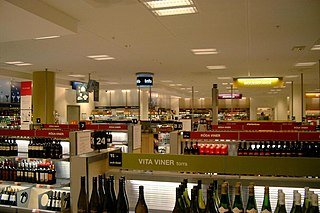Related Research Articles

The Liquor Control Board of Ontario (LCBO) is a Crown corporation that retails and distributes alcoholic beverages throughout the Canadian province of Ontario. It is accountable to the Legislative Assembly through the minister of finance. It was established in 1927 by the government of Premier George Howard Ferguson to sell liquor, wine, and beer. Such sales were banned outright in 1916 as part of prohibition in Canada. The creation of the LCBO marked an easing of the province's temperance regime. By September 2017, the LCBO was operating 651 liquor stores.
The Alcohol and Gaming Commission of Ontario (AGCO) is an Ontario Crown agency that reports to the Ministry of the Attorney General. The AGCO is responsible for regulating the liquor, gaming, cannabis and horse racing sectors in accordance with the principles of honesty and integrity, and in the public interest.

The Oregon Liquor and Cannabis Commission (OLCC), formerly known as Oregon Liquor Control Commission is a government agency of the U.S. state of Oregon. The OLCC was created by an act of the Oregon Legislative Assembly in 1933, days after the repeal of prohibition, as a means of providing control over the distribution, sales and consumption of alcoholic beverages. To this end, the agency was given the authority to regulate and license those who manufacture, sell or serve alcohol. Oregon is one of 18 alcoholic beverage control states that directly control the sales of alcoholic beverages in the United States. In 2014, the passage of Oregon Ballot Measure 91 (2014) legalized the recreational use of marijuana in Oregon and gave regulatory authority to the OLCC.
Alcoholic beverage control states, generally called control states, less often ABC states, are 17 states in the United States that, as of 2016, have state monopoly over the wholesaling or retailing of some or all categories of alcoholic beverages, such as beer, wine, and distilled spirits.
The Saskatchewan Liquor and Gaming Authority is a Treasury Board Crown Corporation responsible for the distribution, control and regulation of alcoholic beverages, cannabis and most gambling in the Canadian province of Saskatchewan. Its head office is located in Regina.
The Liquor and Cannabis Regulation Branch is the agency of the government of British Columbia, within the Ministry of the Public Safety and Solicitor General, responsible for issuing liquor licenses in the province and for enforcing the provisions of the Liquor Control and Licensing Act.
The Washington State Liquor and Cannabis Board, formerly the Washington State Liquor Control Board, is an administrative agency of the State of Washington. The Liquor and Cannabis Board is part of the executive branch and reports to the Governor. The board's primary function is the licensing of on and off premises establishments which sell any type of alcohol, and the enforcement and education of the state's alcohol, tobacco, and cannabis laws.
A liquor license is a governmentally issued permit to sell, manufacture, store, or otherwise use alcoholic beverages.

The Nova Scotia Liquor Corporation (NSLC) is the Crown corporation which controls sales of alcoholic beverages and recreational cannabis in Nova Scotia, Canada. It is the sole distributor for these products and runs all retail outlets selling alcohol and cannabis products. The exceptions are for four private retailers in urban HRM offering beer, wine, and spirits, and, in rural areas where there is not an NSLC location, 65 "agency" liquor stores operated by private retailers on NSLC's behalf.

An alcohol monopoly is a government monopoly on manufacturing and/or retailing of some or all alcoholic beverages, such as beer, wine and spirits. It can be used as an alternative for total prohibition of alcohol. They exist in all Nordic countries except Denmark proper, and in all provinces and territories in Canada except Alberta. In the United States, there are some alcoholic beverage control states, where alcohol wholesale is controlled by a state government operation and retail sales are offered by either state or private retailers.
Gooteleah "Goo" "Mosa" Arlooktoo was a Canadian politician and former cabinet minister from Northwest Territories, Canada. He briefly served as acting premier of the territory.
Joe Arlooktoo is a northern Canadian artist, adept at soapstone and ivory carving, and a municipal and territorial-level politician who was a member of the Northwest Territories Legislature from 1979 until 1991. He is a current councillor of Kimmirut, Nunavut.
Crown corporations in Canada are government organizations with a mixture of commercial and public-policy objectives. They are directly and wholly owned by the Crown.
The Northwest Territories Liquor and Cannabis Commission regulates the distribution, purchase and sale of alcoholic beverages in the Northwest Territories.
The Nunavut Liquor and Cannabis Commission regulates the distribution, purchase and sale of alcoholic beverages and cannabis in the Canadian territory of Nunavut. The retail arms is referred to as Nunavut Liquor Management. It is the smallest and newest liquor control agency in Canada.

Cannabis in Nunavut, as in the rest of Canada, became legal for recreational use on the effective date of the Cannabis Act on 17 October 2018.

On October 17, 2018, cannabis was legalized in Canada for recreational and medical purposes. It was already legal for medicinal purposes, under conditions outlined in the Marihuana for Medical Purposes Regulations issued by Health Canada, and for seed, grain, and fibre production under licence by Health Canada.
Cannabis in Yukon became legal when the national Cannabis Act went into force on October 17, 2018.
References
- ↑ "About the Nunavut Liquor and Cannabis Board". gov.nu.ca. Nunavut Department of Finance. Retrieved 2022-06-20.